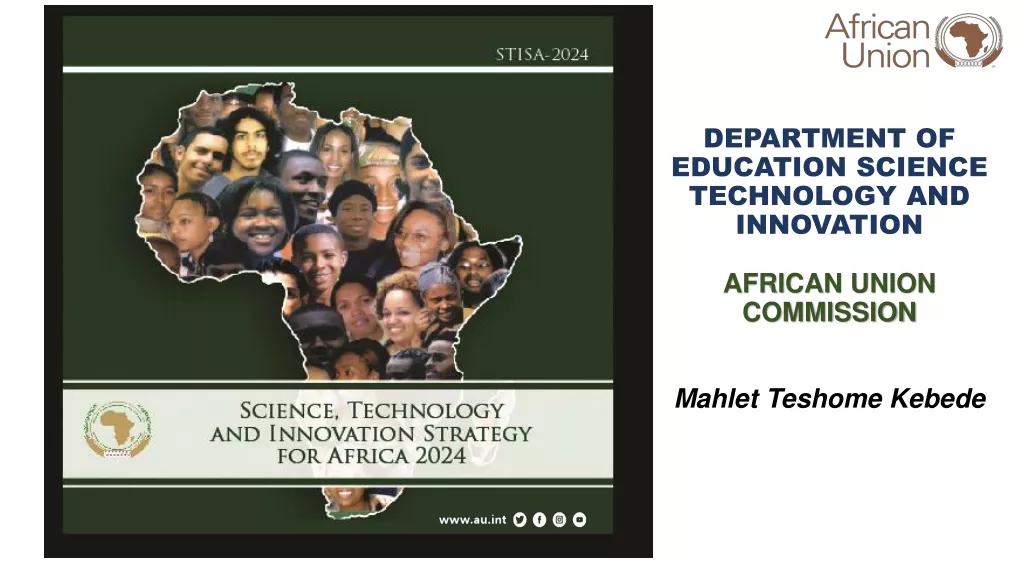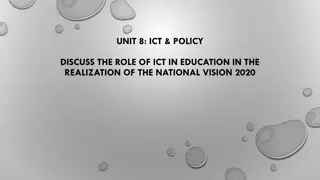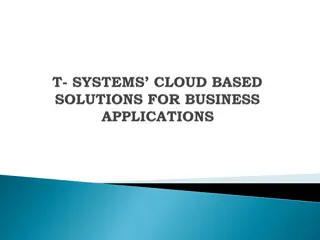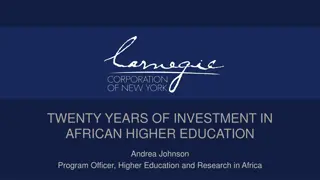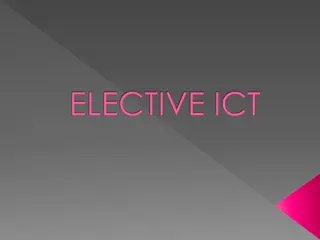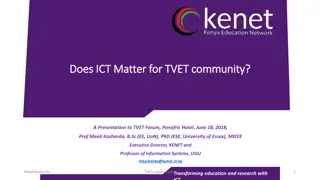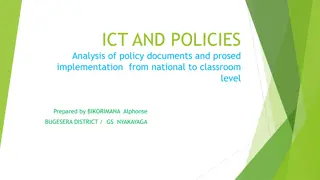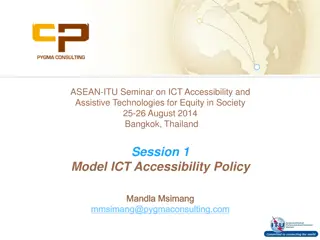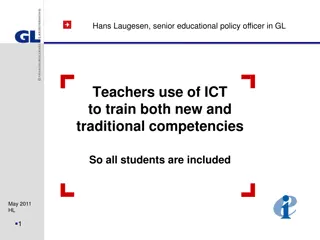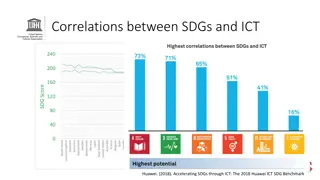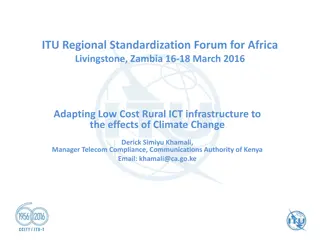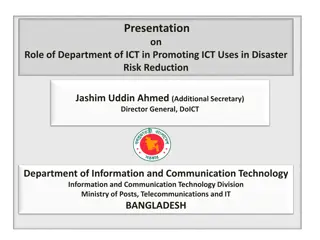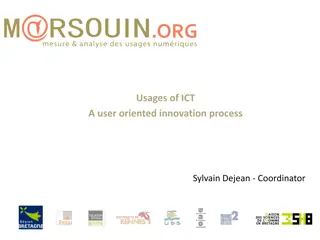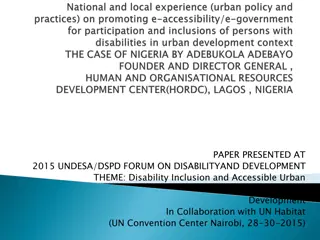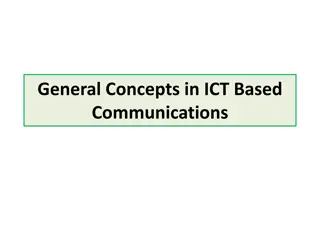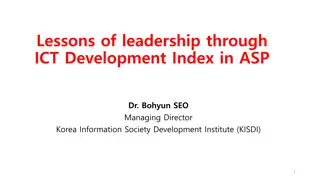Enhancing African Education Through ICT Innovation
As African countries embrace globalization and ICT, investment in relevant technologies is crucial. This article highlights Nigeria's education policy, the e-learning journey at the University of Jos, challenges faced by African universities in sustaining ICT infrastructures, and the initiatives to establish e-learning excellence centers.
Download Presentation

Please find below an Image/Link to download the presentation.
The content on the website is provided AS IS for your information and personal use only. It may not be sold, licensed, or shared on other websites without obtaining consent from the author.If you encounter any issues during the download, it is possible that the publisher has removed the file from their server.
You are allowed to download the files provided on this website for personal or commercial use, subject to the condition that they are used lawfully. All files are the property of their respective owners.
The content on the website is provided AS IS for your information and personal use only. It may not be sold, licensed, or shared on other websites without obtaining consent from the author.
E N D
Presentation Transcript
INTRODUCTION INTRODUCTION Two important realities of our age are globalization and increasing availability and use of ICT across the African Continent. Hence, it is important for African Countries to acquire and deploy technologies that will enable them keep pace with global developments in their areas of need. Investment in relevant ICT technologies is also important to enable African countries share contemporary issues, challenges and developments on the communitiesof learners. continent with global
The policy on Education in Nigeria prescribes that education be used at all levels to promote development. Hence, investment in ICT at the tertiary level of education to facilitate and learning, research, service delivery and overcome challenges is a welcome trend which is government plan and intention. national support teaching, consistent with
THE BEGINNING THE BEGINNING The seeds of e-learning were planted in the 1980 s by the Universityof Jos Administration. An adhoc committee was put in place to examine and document The ability of Computers to facilitate learning, teaching, research services at UNIJOS. While deliberating and acting on the Commitee s report in subsequent years, Administrators clearly demonstrated a shift from the TECHNOLOGY TRANSFER SUSTAINABILITY model. and administrative successive UNIJOS paradigm to a
ICT Infrastructures in some African Universities were developed by foreign investors. This strategy involves heavy initial investment, technologies, short-term maintenance. Subsequently, experience difficulties in sustaining the infrastructures when such investors leave. However, at the Unijos, we acquire technologies to meet our needs. Our experience shows that this approach to ICT technology acquisition may be proceed at a slow pace. However, the loss of speed often translates toagain in sustainability. rapid training integration and such of periodic Universities
With an emphasis on needs assessment, relevant technology acquisition, sustainability and linkages with the Carnegie Corporation, NeTel @ Africa, African Virtual University organisation, the University of Jos has been able to initiate and sustain the following emerging centres of excellence in e-learning: Initiatives and other
1. e-Learning Initiativesat Unijos Library From 1984 to 1988, the library applied computers at the Facultyof Social Sciences to produceserial lists. In 1989, UNESCO donated a software which the library used for bibliographic services. About 26,000 volumes of library stock had been retroconverted. A dedicated server had been acquired for the library to make herservices veryefficient.
A substantial progress in library retroconversion will make possible the deployment of the already acquired OPAQ software to crown efforts at fully automating the library. In addition, Unijos Library staff train the University Community to carry out research processes using many databases accessible on CD-ROMs, the e- granary, intranet and internet.
2. Facultyof Law e-Learning Experiment The faculty mobilised the efforts, resources of both students and staff while collaborating with JOS- Carnegies Partnership Committee to establish and run oneof the most successful computer labs on Campus. The faculty also runs a web-based research lab from where resources from heins-on-line and Westlaw... databases can be accessed. Recently, the faculty embarked on an initiative focused on digitizing the 25 volumes of the faculty s and students journals and uploading these on the net to facilitateaccess at homeand abroad.
Another initiative on digitizing and uploading land- mark High Court judgements in the Central Zone of Nigeria is atan advanced stage. Today, the facilities at the web-based research lab are being used to train law students, faculty staff, lawyers and High Court Judgesacross Nigeria.
3. Faculty e-Learning Initiatives In a response to the challenges of classrooms , under achievement and content assessment, some departments, notably, Mathematics, Anatomy and the Institute of Education are taking steps to digitize some of the heavily subscribed courses in these departments and upload them on Moodle, the LMS of the University. Teaching and learning with Computers is often complemented with interactive CD-ROMs to enhance students access at the Department of Anatomy. At the Faculty of Natural Department has introduced e-learning activities to standardize content delivery and monitoring of students progress in Maths 101, Maths 103. This initiative was recently extended to a course in Computer Sciences. overcrowded the Department of Sciences, the Maths
4.The Sustainability Strategy During the second tranche of the Jos-Carnegie Partnership, the JCPC Decentralization and Dispersal and the Departmental Initiatives not only to foster ownership of ICT at the University but also to further empower staff, students and the Administration to use ICT effectively to enhance teaching, learning, administration. put in place the research and
5.Objectivesof the Departmental Initiatives The main Goal of the Departmental Initiatives program is to promote the adoption of e-learning by staff and students for effective teaching, learning and service delivery at the University of Jos. To achieve this goal, fourobjectiveswere formulated. To stimulate staff and students to use existing ICT facilities. To proposeand implementdepartmental initiatives. To equip academic staff to improve the quality of teaching and learning by enhanced research through the useof ICT. To encourage female departmental initiatives. participation in ICT
6.Sensitization Workshops To achieve objectives 1 and 4, four sensitization workshops were organised for various categories of the female population in the University of Jos, while the Moodle Training was held for both male and female staff. These were: A one-day sensitization workshop for New Female Students A one-day sensitization workshop for Returning and Postgraduate Female Students Two sets of one-day workshops for Female Academics A three-day Moodle Training Workshop Audience for the sensitization workshops comprised; new female students, returning and post-graduate female students and female academic staff. For Moodle, Academic Staff (both maleand female) in the facultiesacross the University.
7.Key Messages Key Messages at the workshops centred on the following topics: ICT Infrastructure at the University of Jos: Their Uses and how to Access Them; Career opportunities in ICT; Women Role Models in ICT Within and Outside; E-Services (e-granary, e-library); Moodle; and Capabilities of Women in ICT.
8.Moodle Training A three-day Moodle Training workshop was held for academic staff from August 13 15, 2008. This was the second such Moodle Training Workshop. The first was organised earlier in the year by DDT. The objective of the second Moodle training Workshop was to sensitize and train an additional 60 academic staff to be able to upload and teach their courses on the learning management system. Consequently, those who took part in the first Moodle training were not included in the second. It was felt that if more academic staff became trained in the use of Moodle, some would eventually wish to use it in teaching some of their courses, while others would indicate some interest in participating in the e-fellowship program.
9.ICT Basic Training DI set up a team that worked on a basic ICT Training Package. This package which has been restructured to involve Microsoft Partnership and Curriculum is now finalized and will soon be uploaded on Moodle for use by members of the University Community. The objective of this program is to bridge the technology gap for those who would like to adopt e-Learning but are reluctant or afraid because they lack basic computer skills. When uploaded on Moodle, the package will provide training in basic computer skills and will be open to e-fellows of the DI sub- intervention as well as members of the University Community. The course is designed in such a way that participants can be self-taught, but the content can also be used by an instructor to train.
10. To achieve objectives 2 and 3, which is aimed at promoting the use of ICT effectively through the Departmental Initiatives, Stakeholder Consultations were held. In collaboration with the Decentralization and Dispersal Team (DDT), DI met with all Faculty Boards in the University except the Faculty of Social Sciences. In order to sensitize Faculty Boards about the e-Fellowship and Departmental Initiatives programmes; to brief them on ICT infrastructures available in the University and how to access them. Between May and June, 2008 the course outline template was developed by DI and this was also shared with Deans of Academic Faculties and solicited their input. Following this, the course outline template was modified and sent back to Deans and Directors of Academic Faculties. They were also invited to the lunch-time forum on the presentation of the course outline template on July 3, 2008, where they were encouraged to make further contributions on the template before it was finalized. Following feedback on the course outline template, DI would now see to it that staff begin to use this, especially following the MoodleTraining.
11. Departmental Initiative Projects Following the one-day Proposal Writing Workshop jointly organised by DDT and DI, a final call for proposals was sent out to participants and a timeline for submission given. Some had already sent in their proposals which received inputs and refinements during the proposal Writing Workshops. The received proposals were screened by DI along with consultants Dr. Tanko and Dr. Oti using criteria already outlined by DI and JCPC. Proposals which showed potential were selected following the screening exercise and award meetings were held with the JCPC. Since even the selected proposals still needed adjustments and refinement, post award meetings were arranged with the awardees to guide them in making the required changes and facilitate implementation. In all, 9 proposals were received and 7 were eventually awarded. Projects will run for 9 12 months and each project will cost between N350,000 to N500,000. Progress reports will be submitted by March 2009. Out of the 7, women headed twoof the project teams.
12. E-Learning Fellowship Projects The e-Learning programme refers to a Community of Academic Fellows who can innovatively use ICT for teaching and learning. The e-Fellows programme allows the university to deepen its level of support and commitment to academic staff by supporting enhancements in e-learning and teaching with technologies. Following the face-to-face sensitization of faculties at their Faculty Board Meetings on the e-Fellowship programme, DI advertised the programme on the University website using the survey monkey software and laid out the requirements for enrolment. An e-Application form was also posted. In addition, an e-mail was sent to all members of the University Community who have a Unijos e-mail address alerting them of the advertisement and the application online. Fellowship (henceforth e-Fellows)
13. Women in ICT The purpose of the proposed website for women in ICT in the University of Jos is to motivate women within the community to embrace ICT in learning, teaching, research, administration development. The website operational, will showcase practising women in ICT on the site as role models to stimulate the female community to follow breakthroughswith respect to the useof ICT. Approval has been sought and obtained for the website to be designed for women in ICT in the University of Jos. The website is under construction. Data are already being obtained from women in ICT within the Universityof Jos Community. and it career becomes when their challenges and
14. Challenges Faced and Plans to Overcome the challenges Although DI was scheduled to start implementing her activities by the 1stOctober, 2007, these activities did not take off until 1stApril, 2008. The delay was occasioned in part by the University Academic Calendar which caused the DDT sub-intervention to conclude her activities later than had been scheduled. However, detailed planning of DI s activities actually climaxed at the University of Hull Meeting and Workshop on Project Management with the ICT Consultants in December 2007, through the facilitation of JCPC and Dr. Tanko Ishaya. Armed with a detailed plan of activities for the year 2008 and the skills learned at the Project Management Workshop at Hull, it was easy and fast to implement the planned activities. The implementation of DI s activities was further facilitated by the close collaboration with the Gender Intervention (GIT), UJNet, PWS and implementation process. the DI Team during the
Secondly, there was pressure on the only functional computer lab for DI s hands-on workshops because of competing demands. However this challenge was overcome through a combination of DI s flexibility in re-scheduling some of their activities and the kind understanding and cooperation of the ICT directorate which accorded priority to DI s activities when schedules were tight. The Directorate also ensured that the computers and accessories were in good working condition during DI s hands-on sessions.
15. Lessons Learned Hands-on and minds-on ICT sensitization sessions, if properly planned and implemented can motivate women academics toembrace ICT. Collaboration between strengthen and facilitate the delivery of DI s activities. Hence, more areas of collaboration will be explored, especially between e-Fellows and the Departmental Initiatives awardees for the delivery of the two projects. interventions helps to


